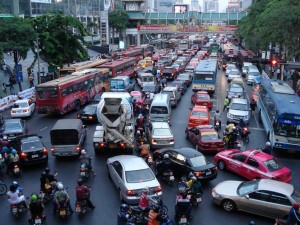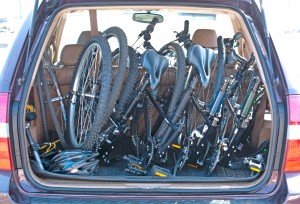 I recently read an article in The Wall Street Journal titled “The Hidden Toll of Traffic Jams”, which examined the effects of prolonged exposure to vehicle emissions on the brain. While it’s too early to draw any direct connections between car exhaust neurological disorders, scientists’ findings revealed preliminary links to an array of neurological conditions, including Alzheimer’s disease and a number developmental delays in children. Further, they found that people with less exposure to car fumes had lower levels of stress, anxiety, and depression.
I recently read an article in The Wall Street Journal titled “The Hidden Toll of Traffic Jams”, which examined the effects of prolonged exposure to vehicle emissions on the brain. While it’s too early to draw any direct connections between car exhaust neurological disorders, scientists’ findings revealed preliminary links to an array of neurological conditions, including Alzheimer’s disease and a number developmental delays in children. Further, they found that people with less exposure to car fumes had lower levels of stress, anxiety, and depression.
None of this is particularly surprising. We all know that breathing in toxic fumes can’t be good for us, we just don’t know what all the long term effects are. Science is starting to tell us, and it doesn’t look good.
So what can we do about it? If even the average person is susceptible to increased risk of neurological problems because of the time they spend in traffic, and since wind and weather patterns can affect areas within a 1.5 mile radius of congested roads, how can we minimize our exposure to this kind of air pollution? It’s simple – we just need to reduce the number of people in cars on the roads.
 Simple, yes. Easy? Well, easier than it might seem at first. Let’s start by asking ourselves why there are so many cars on the road to begin with. It’s because people need to get places, right? And sometimes, a car is the best transportation option available. But people often use their cars even when it’s not the best option. In the city, for example, driving is usually slower, more inconvenient, and more costly than public transit, riding a bike, or even walking. And on a daily basis, most people use their cars to run errands that are 2 miles or less from their home, even though such a short distance is easily travelled by bike.
Simple, yes. Easy? Well, easier than it might seem at first. Let’s start by asking ourselves why there are so many cars on the road to begin with. It’s because people need to get places, right? And sometimes, a car is the best transportation option available. But people often use their cars even when it’s not the best option. In the city, for example, driving is usually slower, more inconvenient, and more costly than public transit, riding a bike, or even walking. And on a daily basis, most people use their cars to run errands that are 2 miles or less from their home, even though such a short distance is easily travelled by bike.
If we want to reduce the amount of car exhaust we’re all exposed to on a daily basis, whether we drive or not, we need to reduce the volume of car exhaust being produced. Because of the utility factor, it’s not realistic to expect people to just stop driving their cars. But it’s conceivable that people would drive less if there were a cleaner transportation option that’s easily compatible with a car.
Luckily, there is. Folding bikes are a great way for people to cut down on their emissions, and save money, time, and if the recent studies are believed, our long term health. With a folding bike in the trunk, you can still drive on the interstate, but when you hit those slower moving city streets, you can park, unfold the bike, and be on your way. And since a Montague bike only takes less 20 seconds to unfold, it takes less time to do a park-and-pedal style commute than to find a parking spot downtown, or even wait for a bus to arrive.
Of course, freeway congestion is a major source of air pollution as well, but driving less in the city is definitely a good start. And if you find yourself becoming more committed to riding, there are usually ways to avoid the highways, which increases your riding time and decreases your contribution to harmful brain-damaging toxins our air.
What do You Think about this Study?
Is it just a given that car exhaust is hazardous to the health? Are the concerns valid? Or is this fear-mongering? What are the best ways to reduce the amount people drive, and by extension, the amount of car exhaust in the environment? Is there anything you will do differently in your daily routine?



I just read today that “dangerous climate change will be essentially irreversible by 2017” according to the International Energy Agency. That is just 5 years from now! We’d better all start exclusively riding our bikes, or it doesn’t look good. Kudos to Montague for writing about this. Please do more, and maybe people will start to listen. Soon…
Even without taking climate change into consideration it would seem we’ve already done irreversible damage to our environment. Riding your bike is great for the world and great for yourself but it’s only a small part of what needs to happen. The people who have real power to change policy need to take energy usage (and where that energy comes from) seriously. It’s sad that even among politicians and government officials there are so many climate change deniers or individuals who think human activity is not affecting climate change. Not to mention all the corporations lobbying congress to NOT pursue alternative energy/transportation because it would be bad for their business. But that opens up a whole can of worms and this probably isn’t the right place to discuss campaign finance reform and the influence big money has on government. Wait, what were we talking about? Oh right – Go ride your bike!